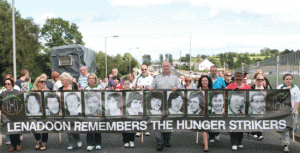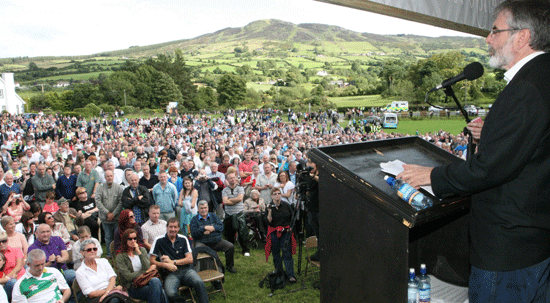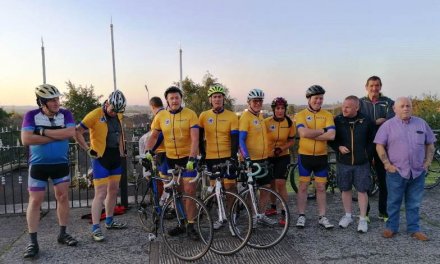Thousands of republicans from across Ireland and many overseas supporters marched through Camlough last Sunday, in the national commemoration to honour the 1981 hunger strikers and Michael Gaughan and Frank Stagg who had died on hunger strike in English jails in 1974 and 1976, respectively. The main address, published below, was given by Sinn Féin President Gerry Adams TD.
‘The Long Road
‘The Hard Road
‘The Brutal Road
‘The Torture Road
‘The Naked Road
‘The Blanket Road
‘The Hunger Road
‘The Martyr Road
‘The road through the long Bog…
‘Ten men walked them all.’
Thus wrote a friend of mine… A sound man that I did time with in the cages of Long Kesh.
This summer we remember with pride, and celebrate the indomitable spirit and strength of character of these ten men, of the blanket men and the women in Armagh. We also remember Frank Stagg and Michael Gaughan.
Cuimhnímis ar ár laochra uilig le bród, bród as á spiorad dochlaoíte (do cleecha).
I want to commend all of those responsible for today’s event. Congratulations – Comhghairdeas. You have all done a remarkable job. Tá obair mhór déanta agaibh uilig chun an comóradh seo a eagrú.
It is entirely proper that we meet here, not far from the graveside of Raymond McCreesh, set among the hills of South Armagh. I want to extend my solidarity to Raymond’s family and to the families of Bobby, Francie, Patsy, Joe, Martin, Kevin, Kieran, Tom and Mickey, and to all of our patriot dead. And I want to thank all of you for attending. Buíochas mór daoibh as bheith anseo ar an lá starúil seo.
Along the lanes and in the fields and hills of South Armagh the decades of war saw a resilient IRA take on the might of the British Army. That determination and audacity and heroism is evident in the life and death of IRA hunger striker Raymond McCreesh and in the love of his parents and family.
The hunger strike was thirty years ago. It was a watershed moment in Irish history. In the summer of 1981 over fifty people were killed and many hundreds more were injured. Thirty thousand plastic bullets were fired, mostly in republican Belfast and Derry. Seven people died as a result, three of them children and countless hundreds injured.
The hunger strike came at the end of a decade in which the British government had employed every conceivable weapon in its substantial military and political arsenal.
Internment; torture; shoot-to-kill actions; rubber and plastic and lead bullets; CS and CR gas; curfews and mass arrests; black propaganda; special courts and special laws and an orange judiciary; sectarian attacks and collusion, and the withdrawal of political status for the prisoners in the H Blocks and Armagh women’s prison, were all part of a concerted British strategy.
So too were its efforts to build political alliances with the SDLP and the Irish government. The British aim was simple – to protect British interests, and to defeat Irish republicanism and the struggle for Irish unity and independence.
Despite its propaganda and lies the British government knew that republicans enjoyed a substantial level of support. So, severing the connection between the republican struggle and the people was key – and criminalisation was a central part of this strategy. Breaking the prisoners was crucial.
Chreid na Sasanaigh gurbh fhéidir príosúnaí poblachtacha a bhuaileadh agus a sceimhliú chun éide coirpigh a chaitheamh, chun obair príosún a dhéanamh agus a gcuid poblachtachas a thréigeadh.
They were supported in this by the northern and southern political establishment.
But, as was so often the case throughout the centuries the British and their local allies misjudged the tenacity and resolve of Irish republicans, and in particular of the prisoners. The account of that period has often been told. Of Kieran Nugent refusing to wearing the prison uniform and saying they would have to nail it to his back.
Of the hundreds of prisoners in the H Blocks – naked, beaten, starved, denied proper medical care or toilet facilities, forced frequently to run the gauntlet of riot clad screws or subjected to the brutality of the mirror search. Of the women in Armagh – isolated and beaten and strip searched who were also denied adequate medical and toilet facilities. Of the families who organised and campaigned through the Relatives Action Committees and then through the National Smash H-Block Campaign. And of the tens of thousands who marched and protested in support of the prisoners.
The hunger strike changed the political landscape in Ireland.
The political gains that have been made since then owe much to the men and women political prisoners and to the sacrifice, resolve and perseverance of the hunger strikers and their families.
Bhí feachtas na bpriosúnaí dírithe ar 5 éileamh chun leasuithe príosúin ach i ndairíre bhí an streachailt ibhfad níos doimhne ná sin.
The prison struggle, like the struggle on the outside, became a battle of will about the right of the Irish people to self-determination and independence and freedom.
 The prisoners knew that. So did the Brits. It was about uniting Ireland. That struggle continues today. And core republican objectives are at the heart of everything we do today.
The prisoners knew that. So did the Brits. It was about uniting Ireland. That struggle continues today. And core republican objectives are at the heart of everything we do today.
The Sinn Féin political strategy is about achieving these objectives.
And let there be no doubt about it. We have a viable project and we have made, are making, and we will continue to make significant progress.
Thirty years ago the north was embroiled in war.
British troops were dug in on these hilltops; people were dying in their scores; nationalist areas were under military occupation and unionists were entrenched behind their laager mentality.
The Sinn Féin strategy brought the British and the unionists and the Irish government to the negotiating table.
Thirty years ago there was an Orange State. The Orange State is gone. The Government of Ireland Act is gone.
The right of citizens to opt for a United Ireland is equal to that of those who wish to retain the union.
Sinn Féin is from that democratic tradition which believes that the British government never had any right to be in Ireland; does not have any right to be in Ireland and never will have any right to be in Ireland.
There is now an entirely peaceful way to bring an end to British rule. Our duty is to develop democratic ways and means to achieve and to unite behind the leadership and the campaigns which will bring this about.
Yes it will be challenging! Yes it will be frustrating! The enemies of change are strong. But that never stopped us in the past.
Remember, once upon a time Margaret Thatcher – remember Margaret Thatcher? Remember she claimed that the north was as British as Finchley! It never was. Britain’s claim to the north is now reduced to a simple majority vote. Of course we have a huge job of work to do to persuade unionists of the merits of the republican and democratic position. But we are also in a very good place to do this.
Sinn Féin is the largest nationalist party in the Assembly and on local Councils.
There are five Sinn Féin Ministers, including our leader Martin McGuinness, who as Deputy First Minister shares the Office of First and Deputy First Minister with Peter Robinson as an equal in all matters. The DUP and UUP, who opposed power sharing, are sharing power in government.
There are all-Ireland political functioning institutions. And in all of these political institutions Sinn Féin is defending the rights and entitlements of all citizens and promoting our republican agenda for unity and equality.
I mbliana tá méadú tagtha ar ionadaíocht pholaitiúil Shinn Féin sna comhairlí áitiúla agus sa Tionól sa Tuaisceart.
In the Oireachtas today, we have a Sinn Féin team of fouteen TDs and three seanadoirí. And in constituencies across the south, especially those where we came close to winning Dáil seats, Sinn Féin is growing organisationally and electorally. In Leinster House our new Dáil team is proving itself to be effective and efficient.
For many we are now the real opposition party, challenging the Fine Gael and Labour government as it imposes a disastrous austerity programme and introduces new stealth taxes on working families. The fact is that Irish republicanism is stronger today than at any time since partition.
Ach chun cuir lenar neart, chun tionchar pholaitiúil agus cumhacht níos láidre caithfidh muid ár streachailt a neartú.
There is no more important time than this for the republican principles of equality, fraternity, and freedom. Tá polasaithe polaitiúla bunaithe ar na prionsabail seo de dhíth go práinneach chun leas ár bpobail.
Republicans need to build our party.
More people need to join Sinn Féin.
More young people need to join Sinn Féin.
We especially need more women to join Sinn Fein.
To take up leadership positions.
And we need to use our growing political strength wisely and successfully and well.
Achieving our republican goals will not be easy. While Unionist leaders now see the benefits of working on an all Ireland basis, they remain opposed to a united Ireland.
So there is work to be done peacefully and democratically with them.
Sinn Fein is up for that work. The British government, despite its protestations to the contrary, and its systems, has yet to face up to its responsibilities to the people of this island. It can best do this by leaving us to manage our own affairs.
The Irish government, and in particular the Irish political establishment, is partitionist.
That is evident in so many ways, for example, in the resistance thus far, to extending voting rights in Presidential elections to Irish citizens living in the north. But there are many people in Ireland who want rid of outsiders ruling us whether from London or the IMF and EU.
They want a free and united and independent Ireland.
I believe there are many people in Ireland who share our goals of a free and united and independent Ireland.
Trí neart pholaitiúil a thógáil agus comhpháirtíocht a chothú beidh muid ábalta ár spriocanna amach.
Sinn Féin is clear about our strategy, clear about our goals and clear about the road map to the future.
We will not be distracted or put off course.
We have a vision of a new future, a better future, and we have the spirit and the confidence to work with others to achieve this.
Raymond McCreesh agus a 9 comrádaí agus na poblachtaigh go leor eile a thug a mbeatha don streachailt thar na blianta, chuidigh siad linn theacht go dtí an áit a bhfuil muid inniu.
There is an enormous responsibility on us to seize the opportunity they created and to make Irish freedom a reality. There is a role for everyone in this new situation. Let us stand together, united behind our republican goals.
Bainimis ár saoirse amach agus tógaimis Éire Aontaithe agus poblacht nua lenar linn.
There is resistance to this. There was also resistance to the blanketmen and the women in Armagh. They knew this. But they kept their eyes on the prize. They were also aware of all of the developments in the campaign and the manoeuvrings by the British and others. They were not put off by any of this. They were steadfast in their determination.
Struggle is hard. Activism can be challenging. There will always be cynics and begrudgers and naysayers.
But there will also always be heroes and heroines. Ray McCreesh and his comrades set an example for every republican. They should be our role models.
Let’s keep our eyes on the prize. In the last entry of his diary Bobby wrote.
‘…at the end of the day everything returns to the primary consideration, that is, the mind. The mind is the most important. But then where does (the) proper mentality stem from?
‘Perhaps from ones desire for freedom…
‘If they aren’t able to destroy the desire for freedom, they won’t break you.
They won’t break me because the desire for freedom, and the freedom of the Irish people is in my heart.
‘The day will dawn when all the people of Ireland will have the desire for freedom to show.
‘It’s then we’ll see the rising of the moon.’




